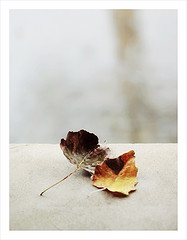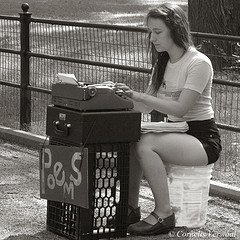In the meadow, in adoration: am I not yours?
November 13, 2010

It must have been about two years ago when I found an old postcard in a book. A sun-glare photograph, and on the back, the note was sprawled: “I’m writing like a chopper and flying low.” It inspired my phase of writing down words, slipping them in borrowed books, and returning them to the library. Hoping they would be found and needed. It was then, too, that I deemed Carl Phillip’s book The Rest of Love some of my favorite poetry pages.
It was about a week ago that I strolled through the library, realized an urgent need for more poetry in my life, spotted Carl Phillip’s poems on the shelf, and gathered them to re-read.
It was tonight as I was reading a poem to myself out-loud that I turned the page and there it was, clicking its toe on the sidewalk with a small smirk, waiting for me: a purple post-it note stuck to the page staunchly declaring in my own handwriting,
Some things fall apart so that other things can fall together.
An unintentional future letter to myself, an unexpected tree-house strung with Christmas lights in the middle of the woods. Found and needed.
Do you want to dance?
November 4, 2010
My body was sprawled on the roof outside my window on an unexpectedly skirt-wearing short-sleeved day in late October, letting frustrated life questions reverberate from my chest to the open blue sky above me: Are my decisions worthwhile? Should I be more practical in my future-attempts?
My dad has this story he told me when I was seven years old about trying to decide whether he should leave his successful financial career to go back to school for teaching. As he was contemplating this dilemma, whispering prayers for guidance to the corner of the room where the wall meets the ceiling, he put on his headphones and immediately heard Michael Jackson’s song “Man in the Mirror” directing the phrase “Go ahead, make that change!” into his eardrums. He listened to Michael. (I reminded him of the way Michael changed his life on the event of Michael’s death, and he seemed slightly embarrassed that I remembered a story he told me when I was a kid. These days he’s cycled back around from teaching to finance.)
This morning, the church service I went to was a drama of the scene where Jesus comes to visit the home of Martha and Mary. Perhaps my favorite story in that giant book. The one where Martha tattle-tales on Mary because she’s running around doing all the work while Mary sits with Jesus and talks. The famous “one thing needful” is to spend that time in simple presence. “Stop taking yourself so damn serious and be present with me,” is pretty much what Jesus says.
So there I am glued to the roof on a perfect autumn day, trapped in suspenseful anticipation for my mind to reach an answer to my questions, trying to contemplate my life decisions with big words because I have 500 more words to learn for the GREs, and Sufjan Stevens crooning on my computer sings to me:
“It’s a long life. Everything is chance. Does it register? Do you want to dance?”
The song saying to me: Stop taking yourself so serious and enjoy the presence of unexpected beauty. The silly is salvation from the ultimately overserious.
I imagined myself whirling around the sky dancing, present and imaginative on the sun-warmed roof, needful.

her trail of incense
August 10, 2010
She was unexpected.
On a day that I had already scheduled full of listening to people give reasons why they have no homes and thinking about ways to peacefully and forcefully engage in a battle against those reasons, she showed up with an unscheduled reason and a sense of urgency in her deeply accented voice. Her homelessness was a reason she didn’t understand.
What I did was listen. She wasn’t my client and I had no obligation to help her, and, in fact, I didn’t have the physical capacity to help her within the confines of my program. But I listened.
Heartaching at the inability to offer her my own resources. Because something warns me if I let her sleep in my house she might take my things. Something worries me that if I give her my food I could run out. Something suggests that I worked for these things and so they are mine to be shared within a safe circle of people I already know who largely already have things of their own. So much for directions to give to those in need. These words must be code for “learn the appropriate agency to call and have the initiative to put in a referral.”

But even through her body-weighing frustration, I could catch a twinkle in her eye when she said she had slept outside under a full moon. I could bear with her frustrated, yet still dazzled, view of life.
She left in a much-calmed state from the frenzy surrounding her appearance. Listening and redirecting were the only things I felt able to do. They changed her demeanor if nothing else. As she left, she pulled a single stick of incense from her bag and handed it to me. “I hope you enjoy the scent.”
Later in the week, one of my plants grew too long to stand on its own. So I stuck her incense in the dirt and tied my leaves to the support, letting the scent of how we need each other drift across me, the neighborhood, the city. And the wondering of how far the smoke will float.
do interesting things
July 31, 2010
It was while I was in the process of moving into a house two blocks away from where I was living that I had long conversations with every neighbor who I’d often briefly encountered during the year when I had lived right next to them.
The quirky man who lives next to my garage heard me sanding an old table and brought over about twenty different electric sanders to see what worked the fastest. The plant man whose garden I had an impressive view of from the roof where I grew my plants saw the sad little pine tree my roommate had thrown away and carried it into his house with confidence there was still some life left in it. The small old woman who lives across the alley happily, and extremely slowly, carried our unwanted kitchen supplies into her house. “I used to do things like move a street over from where I lived,” she said on her way. “That was when I was young and ambitious. My parents thought I was crazy.” My parents, overhearing, smiled and nodded. These are the ways that life changes with age.
And yet, throughout the process of wheeling my container garden up the street to my new house on an old Radio Flyer wagon I’d received from a lovely woman on Freecycle, and while disbursing all our unwanted belongings to the neighbors, and as I restored my trash-picked furniture, I was convinced again and again of the notion that the key to life is to do interesting things. Things that spark up conversations with people you would never meet otherwise. Things that remind strangers of what they haven’t considered doing since they were young. Things that raise eyebrows and elicit questions because they aren’t typical. Collecting conversations and interactions with people in every which way.
a walk to where I go
July 7, 2010

“Wanna walk to Squirrel Hill?” I asked my housemate on a day the weatherman had just informed me would be “oppressively hot.” It was a 2.5-mile trek across Pittsburgh neighborhoods. Each way.
She looked at me like I was crazy. “Well…” she mustered with a disapproving look on her face. She was sitting at her computer looking at pictures on Facebook. “Do you have anything else to do today?” I offered as the only reason I had for why this was a good idea. It worked.
So we set out on our trip. I was inspired by my 60-year-old coworker who lives in Squirrel Hill and walks to and from work every day in East Liberty. Most of the people I work with drive the four blocks down the road to get from our main offices to our food pantry, but this alternative mentality of walking several-mile distances daily seemed so appealing. Usually I bike everywhere, but something about the steady clarity of walking matched the slow-motion mood of the oppressively hot day.
The walk wasn’t great.
By what we decided was the halfway point, we were sweat-dusted and had drained our water bottles in us. We stopped at Pittsburgh Center for the Arts to browse the air conditioning. Our flip-flopped feet were blistering and aching. We stuffed leaves between skin and shoe to dull the pain.
We made it to Ten Thousand Villages, the destination we intended to reach, and back. Even with the difficulties—and likely because of them—walking along with us, it felt like an adventure. Much more than rolling in a car to a store could have. It reminded me of when I lived in Uganda and no one paid much attention to time because everyone walked most places and the journey was just as important as the destination.
The journey is just as important as the destination.
just as you were starting to say something apropos
October 20, 2009
Someone had seen a drawing of a swastika he left on the table and people were getting worried, as if a swastika had any relevance in their daily homeless American lives. They pointed fingers at the small man who always wore long scraggly hair, dark sunglasses, a peace shirt, and a knit red sweater. Maybe Bob Dylan neglected in abstractions for thirty years. Cheech and chong, his therapist said.
I went to find him, interested in how his jumbled words would explain his jumbled drawings, and also embarking on an investigation of the things that make people afraid. He sat calmly in a sun-illumined chair and told me nicely to come in.
I asked him if he liked to draw. “Of course,” he said. “I plan on doing some drawing later today.” And he opened his drawer to reveal a pile of index cards all filled with the same collection of symbols, swastika included. “Can you tell me about your drawings?” I asked. The Babysitter’s Club taught me that’s what you should say when a child proudly presents you with a creation you can’t decipher.
“It’s the ten commandments,” he said. I asked him to explain each symbol to me. He pointed at the first, a stick-table with arrows drawn around it, and acted like he was reading words on the symbol: “Hail Mary full of grace the lord is my shepherd I shall not want you shall have no other gods before me amazing grace how sweet the sound.”
When he had gone through all ten of his symbols in mixed words from scripture, songs, and catachisms, he paused and looked at me. “Looks like you got an earring in your nose. It doesn’t seem very apropos.”
Unexpected words from a such seemingly free-flowing man. First surprising that he considered it not apropos and second that he used the word apropos, something I never before found in regular conversation but was glad I now had.
“You like that one? Put it in your dictionary,” and with that he lifted his hands to mimic playing a violin and started humming amazing grace.
“Amazing grace?” I asked.
“I sing for my supper. It’s the ten commandments. “
poetry reading at a borders bookstore
October 11, 2009
They sat welldressed and clustered, walled in by a Borders bookshelf, I gazing in at the poet speaking into mic from the side. Beside me sat a disgruntled man clearly not present because of the poetry but willing to give it a chance. He ate a reeses fastbreak and giggled during pauses in her words, discovering some kind of secret humor in the professional mask this woman wore as she read pages from her chapbooks which she had marked earlier in preparation for people to hear.
I hardly heard her over the sound of the thick man in purple suitcoat whose white-haired-head bobbed as each poem reached an end in attempts to convince the room he understood and approved its message. The poet interrupted herself mid-poem to acknowledge the entrance of those who belonged in the circle of people she had come to entitle “poetry,” speaking abstractly of her wonderful acquaintances in attendance.
Earlier that day at the homeless shelter, my coworker started strumming the blues on his guitar. A woman stood and sang in sultry impromptu voice:
well
one summer night i was walking
i was walking down the road
and well
if you asked which way i was walking
i couldn’t tell you yes or no
And her passion-sound was poetry to the homeless inhabitants of the room, everyone bobbing their heads to the senseless words composed while they watched expectant, somehow thick with meaning.
When the woman sat down, they turned to me, asked me to read a poem of mine. After watching her and understanding what life was, none of my practiced planned poetry survived on pages.
No. I watch from the side, wondering why poetry is segregation and classification in the places and ways it sounds.
a light growth of green dreams drying
October 2, 2009
I followed the rain drops along the uniquely dusk-colored handrail up to the porch elevated enough to overlook the street and entered into the greenery haven: a porch perfected with complementary walls of vines and twisting leaves caressing its boundaries. I looked around and breathed, a sneak gratefulness for walking in the steps of the people who lived here and pretending this space was mine—the shocks of flower, the bamboo chair, the rain dripping over the green netting and cooling the day.
Then I knocked because I came there to knock and waited. The old man with the look of utterness opened the door and smiled his confused old man smile.
I handed him his lunch with a pressing desire to ensure that someone would enjoy this day from the green space where I stood. “Do you ever eat your lunch out here on the porch?” I asked.
“Well I was sitting out on the porch but I came inside because it started raining.”
“Wouldn’t it be so nice to sit out here with the rain and eat your lunch?” I felt like a somewhat sales person with no clear profit goal.
His eyes got surprisingly big. “You know,” he spoke in wonderment, “All my life I’ve been eating my lunch in the kitchen. You’ve really given me something to think about. Maybe I’ll do that someday.”
And when I left, I’m sure the old man walked slowly back to his kitchen and left the porch begging to be sat on empty, and I walked back to a car hoping that words carry potential for change.
it’s only fallen frames, they told me
September 30, 2009
 After driving to the store to acquire my mom’s requested milk and onions, I pulled to the parking lot’s exit and, giving into an explosive need to break free that was jittering like too much coffee inside of me, I turned onto the street away from the direction of my destination.
After driving to the store to acquire my mom’s requested milk and onions, I pulled to the parking lot’s exit and, giving into an explosive need to break free that was jittering like too much coffee inside of me, I turned onto the street away from the direction of my destination.
A few sporadically chosen turns, and I found myself driving fast through the long, curvy road of the Bedford metroparks, the woodsy haven in the middle of the over-developed suburb where I spent much of my growing-up life wondering around. The trees grew into my road roof that filtered the bright Sunday afternoon sun into granting my body a rare chance to press pedals that propel me effortlessly fast.
The kind of autumn day you dream about.
Driving past all the people walkingrunningjoggingstretchingbiking in herds or alone, I felt crisp cool breezes and listened to sullenly hopeful speaker projections, moving and moving until an end. The end arrived with the sight of an opening that led into Tinker’s Creek, the place where my grandma brought me on young summer days. Once she instructed me to collect rocks that we took into Sunday school the next day and painted. I had painted a bird on mine.
Here, on this starkly unaverage day, I pulled the car next to the creek and watched a moment the woman with her hand tucked safely inside the man’s elbow, together wondering through each other’s company in the form of a grassy space with no destination. The look of content from a distance.
Then I ripped my shoes into shreds and ran to the stream, plodding into the cool water to collect the perfect rock, painted it with poetry and threw it into the sky, called it ebenezer to immortalize the autumn day and the falling away from things I’ve known and the necessary death of some parts of me to allow the experience of rebirth.
It’s mostly about rebirth.
all the surprises in a size too small
September 29, 2009
In middle school in the cafeteria a friend squirted mustard on my brand new white shirt. Her mustard, her fucking clumsiness, my brand new shirt (these types of angered phrases flew across cafeteria trays). I felt angry and I hadn’t yet learned the effects of thrusting my unfiltered young feelings into the face of another young person who would feel something like scared in response. As I said It’s okay in a tone that exuded my regard of it not being okay in the least bit, I could see the wow, what’s her deal? eyes reflecting their way around the occupants of the table.
Back then I was flooded with thoughts of perfectionism, and when things deviated from my preconceived picture—especially when outside the jurisdiction of my control—I felt the falling away too full.
Now it’s different. Today I knocked a bottle of paint all over the floor of my room and laughed out of trained habit. I shrugged when someone told me little boys were outside messing with my bike. I barely noticed when the group of high school volunteers I spent exhausting hours working with this morning broke a chair and ruined a room when I left them alone. I couldn’t recall how to feel when I walked in on a man who had recently thanked me for being so kind to him sprawled dead across his bed.
Growing up might be synonymous with becoming numb to the things that you once felt so full.



